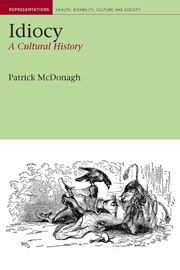Book contents
- Frontmatter
- Contents
- Preface and acknowledgements
- 1 Introduction: idiocy, culture and human relations
- 2 ‘Stripping our own hearts naked’: William Wordsworth and John Wilson read ‘The Idiot Boy’
- 3 A ‘pupil of innocent Nature!’ The wild boy of Aveyron goes to Paris
- 4 Diminished men: masculinity and idiocy
- 5 Essential women: femininity and idiocy
- 6 Holy fools, witty fools, depraved fools: folly, innocence and sin
- 7 History, society, economy: holy fools and idiots come home in nineteenth-century literature
- 8 Barnaby Rudge, idiocy and paternalism: assisting the ‘poor idiot’
- 9 Innocence, philanthropy and economics: the new ‘asylum’ idiot
- 10 Sensational idiocy
- 11 ‘The sins of the fathers’: idiocy, evolution and degeneration
- 12 Danger and degeneracy: the threat of the urban idiot
- 13 The problem of the feeble-minded: the Royal Commission, eugenics and eternal chaos
- Epilogue
- Bibliography
- Index
9 - Innocence, philanthropy and economics: the new ‘asylum’ idiot
- Frontmatter
- Contents
- Preface and acknowledgements
- 1 Introduction: idiocy, culture and human relations
- 2 ‘Stripping our own hearts naked’: William Wordsworth and John Wilson read ‘The Idiot Boy’
- 3 A ‘pupil of innocent Nature!’ The wild boy of Aveyron goes to Paris
- 4 Diminished men: masculinity and idiocy
- 5 Essential women: femininity and idiocy
- 6 Holy fools, witty fools, depraved fools: folly, innocence and sin
- 7 History, society, economy: holy fools and idiots come home in nineteenth-century literature
- 8 Barnaby Rudge, idiocy and paternalism: assisting the ‘poor idiot’
- 9 Innocence, philanthropy and economics: the new ‘asylum’ idiot
- 10 Sensational idiocy
- 11 ‘The sins of the fathers’: idiocy, evolution and degeneration
- 12 Danger and degeneracy: the threat of the urban idiot
- 13 The problem of the feeble-minded: the Royal Commission, eugenics and eternal chaos
- Epilogue
- Bibliography
- Index
Summary
When the brothers Fergus, Ronald and Archie first meet the laird, the landowner to whom they pay rent in Harriet Martineau's 1832 story ‘Ella of Garveloch’, from her Illustrations of Political Economy (1836), only Fergus and Ronald acknowledge him; Archie remains aloof. The laird naturally asks about the third brother, so Fergus answers that, different as he is, Archie ‘is wiser than us about many things, and sees farther. He is always housed before a tempest, or safe in a hole in the rock, like the birds he seems to learn from’ (7). ‘Ella of Garveloch’ provides an introduction to the workings of rental properties, using as a ‘case study’ Ella and her three brothers, her admirer (and eventual husband) Angus, and their improvident neighbours the Murdochs, all inhabitants of the isolated and hostile Garveloch Islands, off the west coast of Scotland. Economic activity intersects with Christian morality through the character of Archie, who is referred to as both an ‘innocent’, by his older sister Ella, and an ‘idiot’, by Callum, the self-important steward of the laird, a notably benevolent landlord. Martineau refers to ‘the island superstition that the poor boy was under special invisible protection, and therefore screened from ill usage at the hand of man, as well as from natural perils’ (30); the fact that Archie apparently learns from the birds, benefits from divine protection and enjoys ‘a keener sight into the place of storms’ (35) than the other islanders reinforces his connection to the natural world, and asserts his place in the design laid out by providence.
- Type
- Chapter
- Information
- IdiocyA Cultural History, pp. 192 - 230Publisher: Liverpool University PressPrint publication year: 2008

